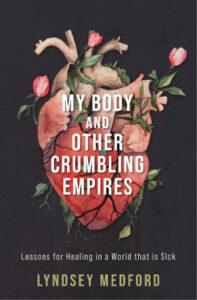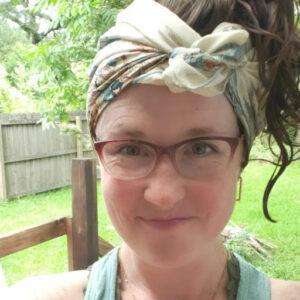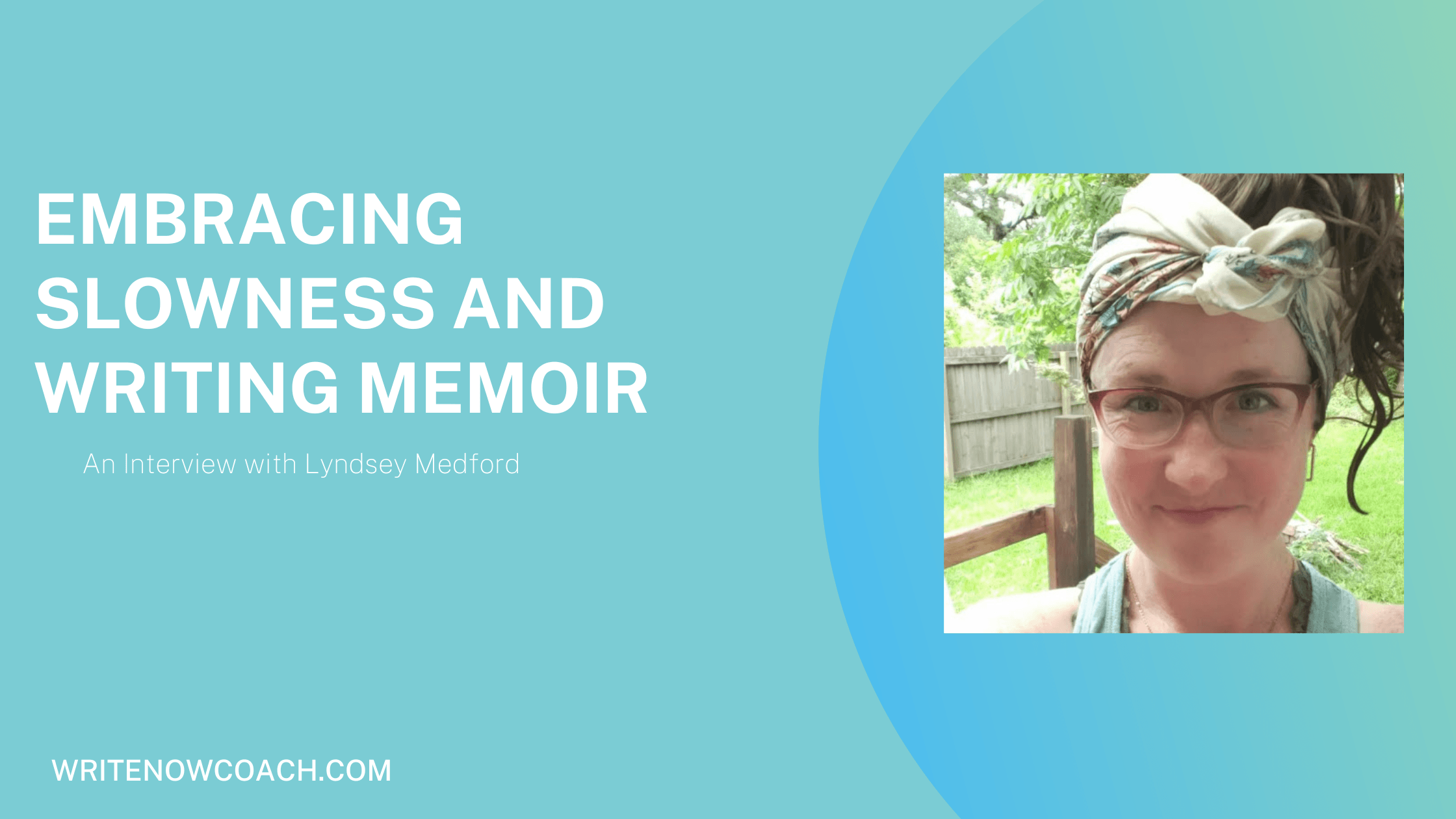Writing Memoir
May 23, 2023
Note From Rochelle
Dear Writers,
I’m thrilled to welcome Lyndsey Medford to the blog to talk about her memoir, My Body and Other Crumbling Empires. Her story will help you embrace your own humanness, connect to your spiritual process, and consider how slowing down might benefit your writing practice. Enjoy!
Happy writing,
Rochelle, the Write Now! Coach
Embracing Slowness & Writing Memoir
An Interview with Lyndsey Medford
Welcome to the blog. Tell us about your new book, My Body and Other Crumbling Empires.
 Thanks so much, Rochelle! My Body and Other Crumbling Empires is a researched memoir about my experience with autoimmune disease and what that taught me about healing the world. I had lots of ambitions to save the world when I got really sick at age 26 and had to really reckon with what I believed about my body, God, and my value to the world.
Thanks so much, Rochelle! My Body and Other Crumbling Empires is a researched memoir about my experience with autoimmune disease and what that taught me about healing the world. I had lots of ambitions to save the world when I got really sick at age 26 and had to really reckon with what I believed about my body, God, and my value to the world.
Eventually, I was able to put together several pieces of the puzzle of what was making me sick (besides just my unlucky genes); and the more I learned, the more I recognized that these were also things making the world sick. But those experiences also taught me that the ways I’d once believed we should go about “fixing” them can actually be counterproductive. Healing is very different from fixing. Healing requires us to look at things with respect, as more than broken; it takes a slow and winding path; it asks us to bring our whole selves and be open to change in our whole lives. And that’s often an unexpectedly beautiful, and deeply effective, countercultural journey.
Why do you consider slowness a tool for creating change rather than a hindrance? And a follow up—can you talk about how you balanced adding writing to your schedule when you were dealing with chronic illness?
We’re taught a really narrow definition of “efficiency” that often doesn’t measure everything that’s important to us. So we get stuck in a sense of urgency, or chasing after the latest “solution,” when actually our problems are offering us feedback and asking us to listen. When we slow down, we can pay attention to what is working and what resources are already available. We can start small with trying new things, which allows us to implement them at a sustainable pace, and also lets us be creative and make mistakes at a non-catastrophic scale. We make space to ask better questions and notice small clues that might point to deeper root causes—which means deeper, more long-lasting change.
When I got sick, I was writing in the margins of a new family, new town, and a full-time job. So when I got laid off from the job and scaled back my ambitions for the other things, writing was sort of what remained. That’s been a privilege, as well as a real need—to work part-time or not at all. Reading and writing always make me feel like myself and overall fill me up more than they drain me.
The career part—the social media, marketing, networking, consistently publishing a newsletter—has been a lot harder. But after struggling with those things for a really long time, I’ve learned how effective it is to take things slow there, too. What do I really like doing? How can I value and deepen my connection with my current audience and network? My numbers are still relatively small, but they’re always growing, my readers are super loyal and help me share, and the authenticity and enjoyment make it all sustainable for me.
Many talk about writing as a healing process. There have even been medical studies! How was writing this book healing for you?
Sometimes as an advocate for myself or for others I find myself saying that chronically ill and disabled people have lots to offer the world, a whole countercultural way of being that is beautiful. Writing this book was an opportunity to show what I mean by that. It’s also hard just to feel like you can be seen at all, and especially seen as a whole person, when you’re sick or when the world isn’t set up to be accessible to you. So telling my story felt like bearing witness to my younger self who’d been so isolated—and in the process, I think, to lots of other people who are overlooked or disinvited because of their bodies and needs.
Can you talk about your publishing process. What tips would you offer to readers?
I guess this actually goes back to the slowness idea—both my agent and my editor are these amazing book people who really believed in the ideas and the writing and trusted that the book would find its readers even though I didn’t have dazzling platform numbers. So that was a slow process, but a smooth one, and it was building on the ten or so years of writing and craft work (and networking at a few conferences and workshops) that had preceded the actual pitching part.
In the process of writing and publishing, I found myself feeling grateful that I had a challenging and interesting topic, a story I was passionate about, and big questions to tackle. It wouldn’t have served anyone if I’d tried to play it safe in terms of subject matter. It all takes perseverance that I was able to draw from my own sense of adventure in exploring these ideas.
Do you have any writers who have struggled with chronic illness that you look to as your mentors?
Yes! KJ Ramsey, who wrote the foreword for My Body and Other Crumbling Empires, is another chronically ill author (and now great friend) who I literally met through a paid group mentorship with her. Dr. Chanequa Walker-Barnes taught a workshop I got to attend and is such a kind and wise voice who’s way ahead of me on a lot of these things. Sarah Bessey is not a personal acquaintance, but someone I also look up to and follow closely to see how she navigates these things. I really consider all my friends my mentors, too, including Brittany Paschall, Elizabeth Cravillion, and Holly Stallcup.
What are you reading now?
Oh, I have way too many books going as usual, and I’ve replaced a lot of my social media scrolling time with the Substack app.
The Island of the Day Before by Umberto Eco, Book Lovers by Emily Henry, Simply Complexity by Neil Johnson, After Whiteness by Willie Jennings, and the Culture Study, Brutal South, Notes from a Neighbor, and Austin Kleon Substacks.
 About the author. Lyndsey Medford lives with a rare autoimmune disorder in the American South and is the author of My Body and Other Crumbling Empires: Lessons for Healing in a World That is Sick. She writes and speaks about spirituality and justice in the ecosystems of our lives. Lyndsey writes at www.instagram.com/lyndseymedford and to her email list via www.lyndseymedford.com.
About the author. Lyndsey Medford lives with a rare autoimmune disorder in the American South and is the author of My Body and Other Crumbling Empires: Lessons for Healing in a World That is Sick. She writes and speaks about spirituality and justice in the ecosystems of our lives. Lyndsey writes at www.instagram.com/lyndseymedford and to her email list via www.lyndseymedford.com.









